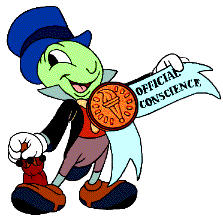Just over a year ago, I was pumped to go to a particular RCIA class. That week we were going to be talking about morality! I had already accepted that contraception was wrong, and I couldn't wait to have the reasoning behind the Church's other social teachings explained. I was eager to embrace it all! So you can imagine my disappointment when we didn't get to the juicy stuff like homosexuality and the death penalty, the things that really gets people's dander up. All we did was talk about "the morality of a certain act" and consciences. I was frustrated - why weren't we getting to the really good stuff? Instead of getting fired up, I was getting bored.
It's taken me a while, but I've come to realize the importance of understanding objective morality and conscience forming before getting to specific teachings. It really sets the whole stage. In particular, I've really appreciated everything I've learned about the conscience.

We all of course have a general idea of what the conscience is, influenced to a greater or lesser extent by a certain singing cricket. In case you were curious about the Church's official stance on conscience, here's what the Catechism has to say about it:
"Conscience is a judgment of reason by which the human person recognizes the moral quality of a concrete act." (CCC 1796)
"Deep within his conscience man discovers a law which he has not laid upon himself but which he must obey. Its voice, ever calling him to love and to do what is good and to avoid evil, sounds in his heart at the right moment. ... For man has in his heart a law inscribed by God. ... His conscience is man's most secret core and sanctuary. There he is alone with God whose voice echoes in his depths." (CCC 1776, quoting Gaudiem et Spes 16)
"When he listens to his conscience, the prudent man can hear God speaking." (CCC 1777)
"Faced with a moral choice, conscience can make either a right judgment in accordance with reason and the divine law or, on the contrary, an erroneous judgment that departs from them." (CCC 1799)
"Conscience enables one to assume responsibility for the acts performed." (CCC 1781)
The Catechism stresses that people have a right, even a duty, to follow their conscience.
"A human being must always obey the certain judgment of his conscience." (CCC 1800)
This is where it gets interesting, in my opinion. What do you do when so many people are doing different things and they say their conscience is fine with it? How is it that we have so much variation in our consciences?
Well, it turns out, our conscience can be wrong! There is such a thing as objective right and wrong, and our conscience may err in judging the two. It seems to me that ignorance is the number one reason this happens. Ignorance doesn't always fly as an excuse, however; if a person doesn't attempt to find out the right thing or is blinded by their own continual sins, they are still culpable (CCC 1791).
That is why it's super important to form our conscience well.
"The education of conscience is indispensable for human beings who are subjected to negative influences and tempted by sin to prefer their own judgment and to reject authoritative teachings. The education of the conscience is a lifelong task." (CCC 1783-4)
So how do we go about this? A book called This is our faith gives a list of steps we can follow to align our conscience with God's will. I think this is really helpful, so I'm listing what the author says here (taking from pgs 251-253; he gives more detail, but I didn't want to completely copy all three pages!).
- Find the facts.
- Examine your motives.
- Think of the possible effects.
- Consider alternatives.
- What does the law have to say? (Natural law, civil law, divine law, church law)
- What is the reasonable thing to do?
- What does your own experience and that of other people say about the issue?
- What would Jesus have done? (Golden rule, end doesn't justify the means, respect neighbor and their conscience)
- What is the teaching of the church?
- Pray for guidance.
- Admit that you sometimes sin and might be wrong.
- After all of this, follow your conscience.
Above all, a person's conscience should be formed by the Word of God.
"The Word of God is a light for our path. We must assimilate it in faith and prayer and put it into practice. This is how moral conscience is formed." (CCC 1802)
I for one had never thought about taking the time to form my conscience. Have you? Have you ever had a time where you struggled with your conscience, or found that your conscience was at odds with others?